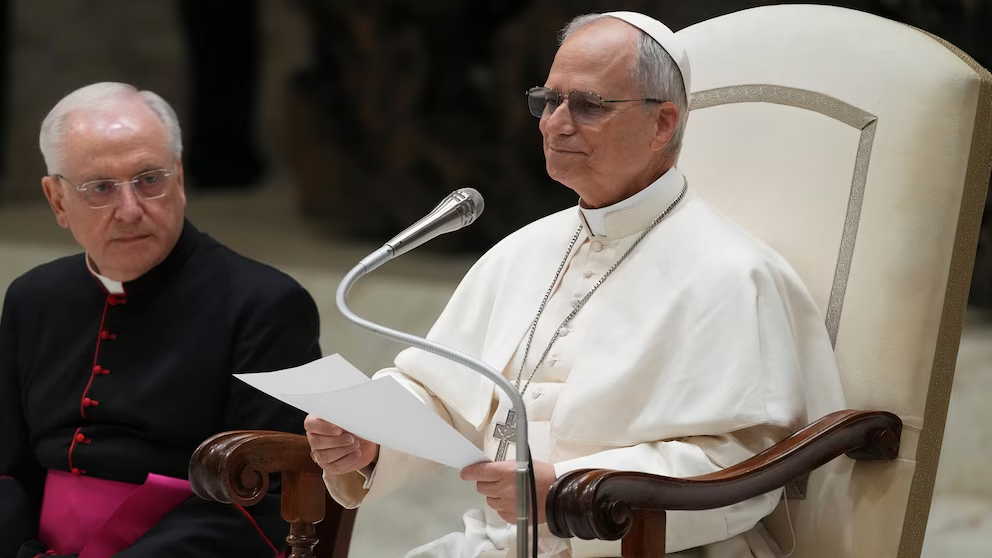‘He Listened to Me’: Victims of an Abusive Catholic Group Say Pope Leo XIV Helped When Others Didn’t

Pope Leo XIV
Introduction: Setting the Scene
Within the landscape of religious institutions, instances of abuse have emerged as deeply troubling issues, particularly within the Catholic Church. The historical prevalence of misconduct has led to significant scrutiny, prompting discussions surrounding accountability and justice for victims. The Catholic community has faced numerous allegations concerning clerical abuse, with survivors courageously coming forward to share their harrowing experiences. These accounts, often laden with pain and trauma, underline the pressing need for systemic reform and a compassionate approach to healing.
Recent revelations have highlighted the accounts from victims of an abusive group within the Church, shedding light on a narrative that has long remained in the shadows. These survivors’ voices, courageous and unwavering, emphasize a critical aspect of the ongoing dialogue surrounding ecclesiastical accountability. As victims recount their stories, the importance of listening to their experiences becomes paramount. When institutions fail to provide adequate support, it is crucial that individuals like Pope Leo XIV step in to address the grievances of those affected.
Pope Leo XIV has emerged as a beacon of hope for many, demonstrating a commitment to acknowledging and responding to the needs of survivors. His willingness to engage in conversation with victims marks a significant departure from previous patterns of silence prevalent in religious institutions. This leadership not only fosters a sense of justice but also signifies the transformative power of acknowledgment. By lending an ear to those who have suffered, Pope Leo XIV exemplifies how accountability can lead to healing, both for individuals and for the Church as a whole.
The stories of survivors captured in this blog post encapsulate the intricate relationship between faith, accountability, and the necessity for listening. The journey toward justice is complex, but with leadership willing to confront these issues, there exists a path forward for healing and restoration within the Catholic community.
Understanding the Allegations Against the Group
The allegations against the abusive Catholic group are deeply concerning, involving a range of abusive actions that have been reported by numerous victims. The victims describe their experiences as tragic, having endured significant emotional, physical, and spiritual abuse within the group’s environment. Testimonies from these individuals reveal a pattern of manipulation and control, where members were subjected to degrading treatment and psychological torment.
Emotional abuse emerged as one of the most prevalent forms of aggression reported by victims. Many shared stories of being ridiculed, isolated, and coerced into compliance, stripping them of their self-worth and autonomy. The group reportedly employed various tactics to instill fear and uncertainty, creating a culture in which dissent was not tolerated. Victims have expressed that this emotional torment often left them feeling trapped and without hope, further complicating their ability to seek help or escape the situation.
In addition to emotional abuse, accounts of physical violence were frequently mentioned. Survivors recounted incidents where members were physically assaulted, often under the guise of discipline or correction. These acts were purportedly justified by the group as necessary interventions to maintain order and fidelity to their beliefs. Such justifications, however, contributed to an environment of terror, leaving lasting emotional and physical scars on those affected.
Furthermore, the spiritual abuse detailed by survivors signaled a profound violation of trust and faith. Victims highlighted how their spiritual beliefs were exploited; they were often made to feel guilty for questioning authority or seeking outside perspectives. This manipulation created a false sense of spiritual obligation to the group, making it exceedingly difficult for individuals to break free from its grasp. The cumulative impact of these abuses led many to experience not only immediate distress but also long-term psychological challenges.
Overall, the disturbing allegations against the Catholic group paint a vivid picture of systematic abuse that has profoundly affected the lives of its victims. These testimonies underscore the need for accountability and continued advocacy for those who have suffered in silence.
Pope Leo XIV: A New Hope for Victims
Pope Leo XIV emerged as a pivotal figure in the Catholic Church during a time when victims of abuse were seeking acknowledgment and justice. His appointment marks a significant shift in the Vatican’s approach to the heinous issue of abuse allegations within the Church, particularly given the historical context. Previous papacies often adopted defensively, emphasizing institutional integrity over individual suffering, a stance that left many victims feeling unheard and marginalized. In stark contrast, Pope Leo XIV has embraced a message centered on compassion and understanding, which resonated deeply with those who have borne the scars of abuse.
Raised in a culturally rich environment that fostered an appreciation for human dignity, Pope Leo XIV’s formative experiences informed his empathetic responses to victims. His initial outreach to individuals recounting their painful stories symbolizes a monumental change in leadership style. Rather than employing administrative distance, he has chosen to engage directly and intimately with survivors, providing them a platform to share their narratives. As a result, victims have expressed newfound hope, feeling validated and believed for the first time.
The Pope’s commitment to listening extends beyond mere rhetoric; he has initiated several programs focused on mental health support and advocacy for victims, distinguishing his papacy from his predecessors. This empathic pivot is more than a strategic response; it aligns with the Church’s moral obligation to protect the vulnerable and reinforce trust within its community. By publicly addressing these issues, Pope Leo XIV has ignited a broader conversation about accountability, the need for systemic change within Church hierarchies, and the imperative to foster healing. This benevolent approach has inspired hope in many, signaling a substantial evolution towards transparency and compassion in the institution that once failed them.
Victims Speak: Personal Testimonies
The experiences shared by victims of the abusive Catholic group reveal profound trauma and the enduring impact of their encounters. Many individuals recount moments filled with despair, loneliness, and the desperate need for validation. One survivor poignantly expresses, “For years, I felt invisible and unheard, as if my pain didn’t matter to anyone. But when I learned that Pope Leo XIV acknowledged my experiences, it was as if a weight had been lifted off my shoulders.” This longing for recognition is a recurring theme in testimonies, highlighting a need that transcends mere words.
Another victim describes their journey towards healing, stating, “I struggled for years, questioning my worth and whether my voice would ever be validated. The Pope’s support gave me the courage to confront my past. Knowing that someone in such a powerful position believed in me made all the difference.” These accounts underline the importance of being heard; for many, it was the catalyst for their ability to embrace healing and reclaim their lives. The emotional weight of these experiences is heavy, and the validation from a figure like Pope Leo XIV provided a source of strength that many had previously thought unattainable.
Furthermore, the role of spiritual support in the recovery process is evident in these testimonials. Survivors share how Pope Leo XIV’s actions resonated deeply with them, reinforcing their faith and offering a sense of solace amidst turmoil. “I felt a renewed connection to my spirituality. His attention to our pain reminded us that we are not alone,” recalls one victim, clearly articulating the intertwining of spiritual and emotional healing. Thus, the testimonies from survivors of the abusive Catholic group encapsulate a collective yearning for understanding and the transformative power of acknowledgment, demonstrating how compassion and validation from influential figures can facilitate profound recovery journeys.
Responses from the Catholic Church
The allegations brought forth by victims of the abusive Catholic group have elicited a range of responses from the Catholic Church, showcasing varying levels of empathy and action. Following the testimonies, church officials have expressed a commitment to listening to the grievances of those affected. The stance of Pope Leo XIV has been particularly highlighted, as he actively engaged with the victims, providing them with a platform to share their experiences—a notable departure from historical practices where such allegations were often dismissed or minimized.
Moreover, advocacy groups have reacted favorably to the pope’s empathetic approach. These organizations emphasize the necessity of establishing a culture of openness and accountability within the Church. They argue that only through acknowledging past grievances can substantial reforms take place. The public reaction has also been complex; some members of the laity express support for Pope Leo XIV’s initiatives, while others remain skeptical about the permanence of such changes, citing a longstanding tradition of institutional silence concerning abuse allegations.
Additionally, the Church’s official statements have reflected a broader commitment to reform. Leaders have reiterated the importance of listening, both in terms of language and action, to ensure victims feel validated and supported. The implications of this approach may reshape church policies moving forward, potentially introducing stricter guidelines on how allegations are handled and ensuring that the victims’ voices are central in these discussions.
As the Church moves forward, the influence of Pope Leo XIV’s listening approach may pave the way for more transparent and compassionate responses to abuse claims, fostering an environment where healing can begin and preventive measures can be put in place. This evolving stance indicates a possible shift in the Church’s culture, underlining the importance of addressing the needs of those who have suffered in silence for far too long.
The Ripple Effect: Impact on Other Survivors
The actions taken by Pope Leo XIV in addressing the abuses within a particular Catholic group have not only provided comfort to the immediate victims but have also resonated far beyond the confines of this specific occurrence. His willingness to listen and take decisive action has instigated a ripple effect, encouraging other survivors of abuse—both within the Catholic Church and other religious organizations—to share their experiences. This collective movement leads to greater accountability and transparency in spiritual leadership, a concept that is gaining momentum across various religious communities.
As more individuals step forward, the stigma that often accompanies discussions of abuse is gradually being dismantled. Survivors are finding courage in numbers, realizing that they are part of a larger community that refuses to remain silent. The narrative surrounding victims of abuse, particularly in religious contexts, is shifting from one of shame and isolation to one of empowerment and solidarity. This transformation has been significantly influenced by the Pope’s proactive approach, which has set a precedent for spiritual leaders worldwide to acknowledge issues of abuse and advocate for those affected.
The push for reform is gaining traction not just in Catholicism but also in various faiths, where varying degrees of abuse have surfaced. Many organizations are now compelled to reflect on their policies and protocols, with an emphasis on safeguarding vulnerable individuals within their congregations. Survivors are increasingly calling for transparency and accountability, demanding that their voices be heard and their experiences validated. The consequences of Pope Leo XIV’s actions exemplify how one leader’s bravery can galvanize an entire movement committed to preventing further abuse and supporting survivors.
Advocacy and the Future of Abuse Cases
Advocacy organizations play a pivotal role in addressing the complex issues surrounding abuse cases within the Catholic Church and similar institutions. These organizations not only provide support and resources for victims but also work tirelessly to raise awareness about the pervasive nature of abuse and the systemic failures that have historically hindered accountability. By amplifying the voices of survivors, advocacy groups help ensure that their experiences are acknowledged and validated, facilitating a crucial first step towards healing and justice.
Ongoing education within communities, particularly concerning the dynamics of abuse, is essential. Advocacy organizations are instrumental in creating educational programs that inform both the public and professionals about the signs of abuse, the importance of believing survivors, and the mechanisms necessary for reporting incidents appropriately. By fostering awareness, these organizations empower individuals to act effectively when they suspect abuse and encourage a culture of transparency and accountability in institutions.
Moreover, support networks established by advocacy groups offer survivors a safe space to share their experiences and seek emotional and psychological support. These networks not only help in healing but also advocate for the necessary legal reforms needed to protect future victims. By lobbying for legislative changes, such as extending statutes of limitations for filing abuse claims and improving reporting mechanisms within institutions, these organizations strive to create an environment where victims feel safe coming forward.
In this context, organizations focus on creating collaborative efforts with legal experts, policymakers, and other stakeholders to ensure that their recommendations can translate into tangible reforms. This approach encourages systems that are more responsive to victims’ needs and fosters a culture that prioritizes the protection of children and vulnerable individuals. Thus, through advocacy, education, and support, there is hope for a future where the voices of victims are not only heard but respected and acted upon.
Conclusion: The Path Forward
The experiences shared by the victims of the abusive Catholic group highlight a crucial narrative surrounding institutional accountability and the necessity of listening to those who have suffered. In reflecting upon their stories, it becomes evident that genuine engagement from leaders, particularly from high-ranking figures like Pope Leo XIV, can serve as a powerful catalyst for healing. The act of listening is not merely a passive response but an active commitment to recognizing pain and advocating for justice.
Throughout the blog post, we explored the importance of allowing victims to voice their experiences, ensuring that their feelings and realities are validated. When religious leaders actively listen, they create a supportive environment that promotes healing, which is essential for rebuilding trust in the community. This commitment to attentiveness fosters accountability, making it more difficult for abusive practices to persist unchallenged. The testimonies highlight a pivotal moment where acknowledgment by a leader can transform despair into hope, illustrating the profound impact such recognition can have on victim recovery.
Furthermore, systemic changes are imperative within religious institutions to safeguard against future abuses. By embedding a culture of listening and responsiveness, these organizations can enhance their structures to prioritize the dignity and welfare of every individual. The ripple effect of such changes extends beyond individual healing; it can reshape entire communities, offering reassurance that spirituality and morality will not be compromised by silence or neglect.
In conclusion, the path forward necessitates a robust commitment from religious leaders to engage deeply with victims. By prioritizing listening and advocacy, there is significant potential for positive change, allowing for accountability and healing to flourish in places of worship and beyond. This proactive approach will not only foster a more just environment but also encourage a culture of openness that reflects the genuine values of compassion and justice at the heart of religious teachings.
Call to Action: Supporting Victims
In light of the profound challenges faced by victims of abuse within organizations, including religious institutions, it is imperative that we collectively take action to support their healing and pursuit of justice. Advocacy efforts are crucial in providing necessary resources for these individuals, who often grapple with extensive emotional and physical trauma. These efforts can range from raising awareness to facilitating access to counseling and legal representation for survivors. Every action counts, and as a community, we have the power to contribute meaningfully.
One effective way to support victims is through financial contributions to organizations that champion their rights and offer assistance to those in need. Donations to such advocacy groups can help fund essential services, including therapy, legal aid, and outreach programs that specifically target survivors of abuse. Furthermore, volunteering time and expertise for these organizations can also significantly bolster their efforts. Offering skills such as counseling, legal advice, or even administrative support can have a direct and positive impact on their operations.
Amplifying the voices of survivors is another vital aspect of support. Engaging in dialogue, sharing their stories, and promoting their narratives play a critical role in breaking the silence that often surrounds abuse cases. Utilizing social media platforms, writing articles, or participating in community forums can create a larger platform for these individuals to be heard, fostering a culture of accountability and empowering others to come forward.
For those affected by abuse seeking help, numerous resources are available, such as local hotlines, support groups, and healthcare providers specializing in trauma recovery. Remember, every step taken toward supporting victims of abuse is a step towards healing and justice. Collectively, we can create a safer and more supportive environment for survivors, advocating for their dignity and rights in a society that often overlooks their suffering.










Leave a Reply
You must be logged in to post a comment.